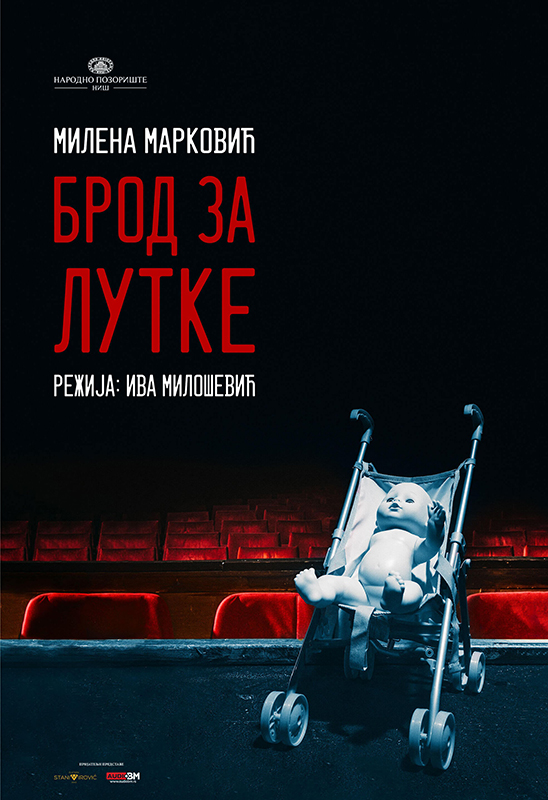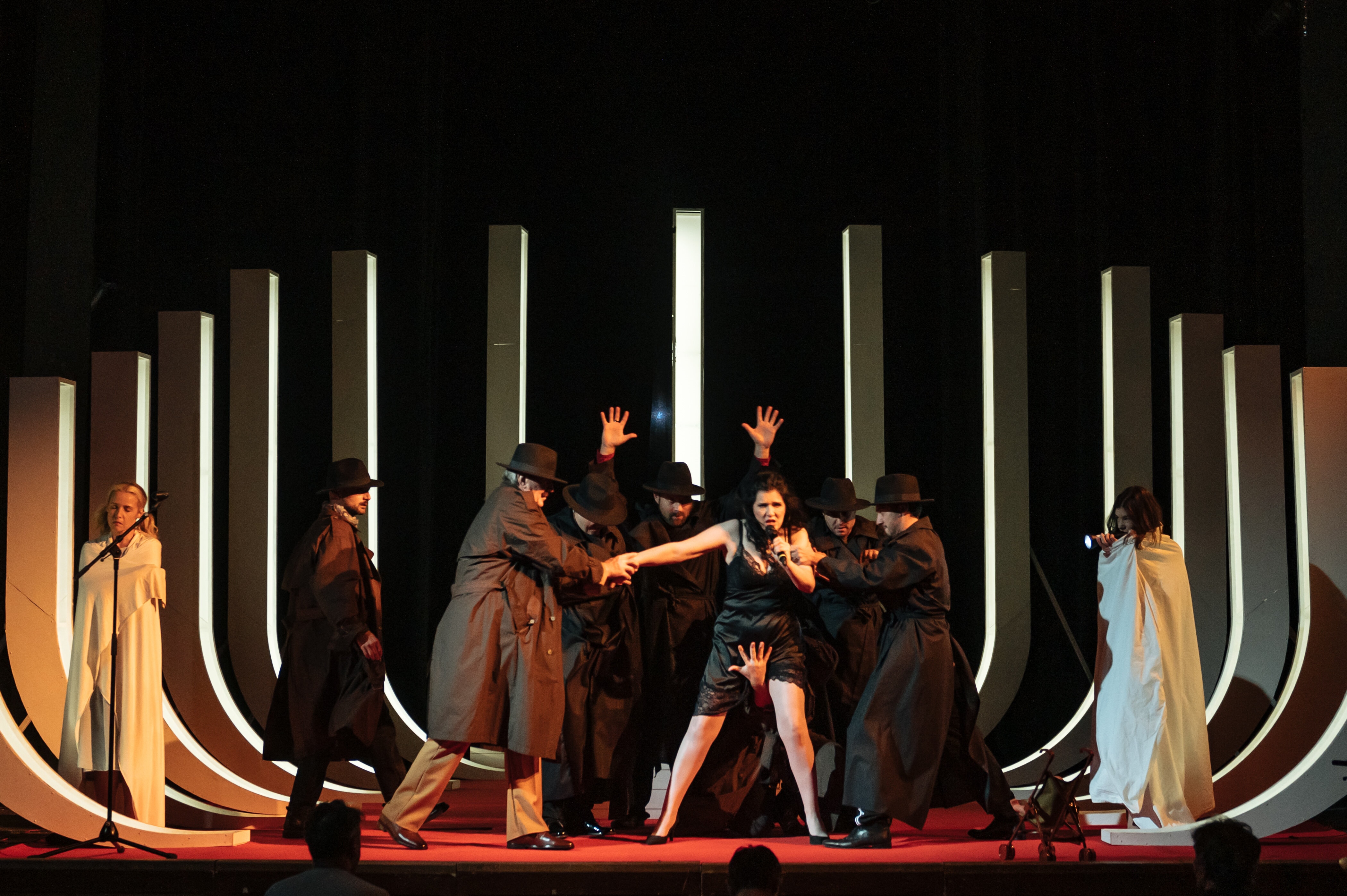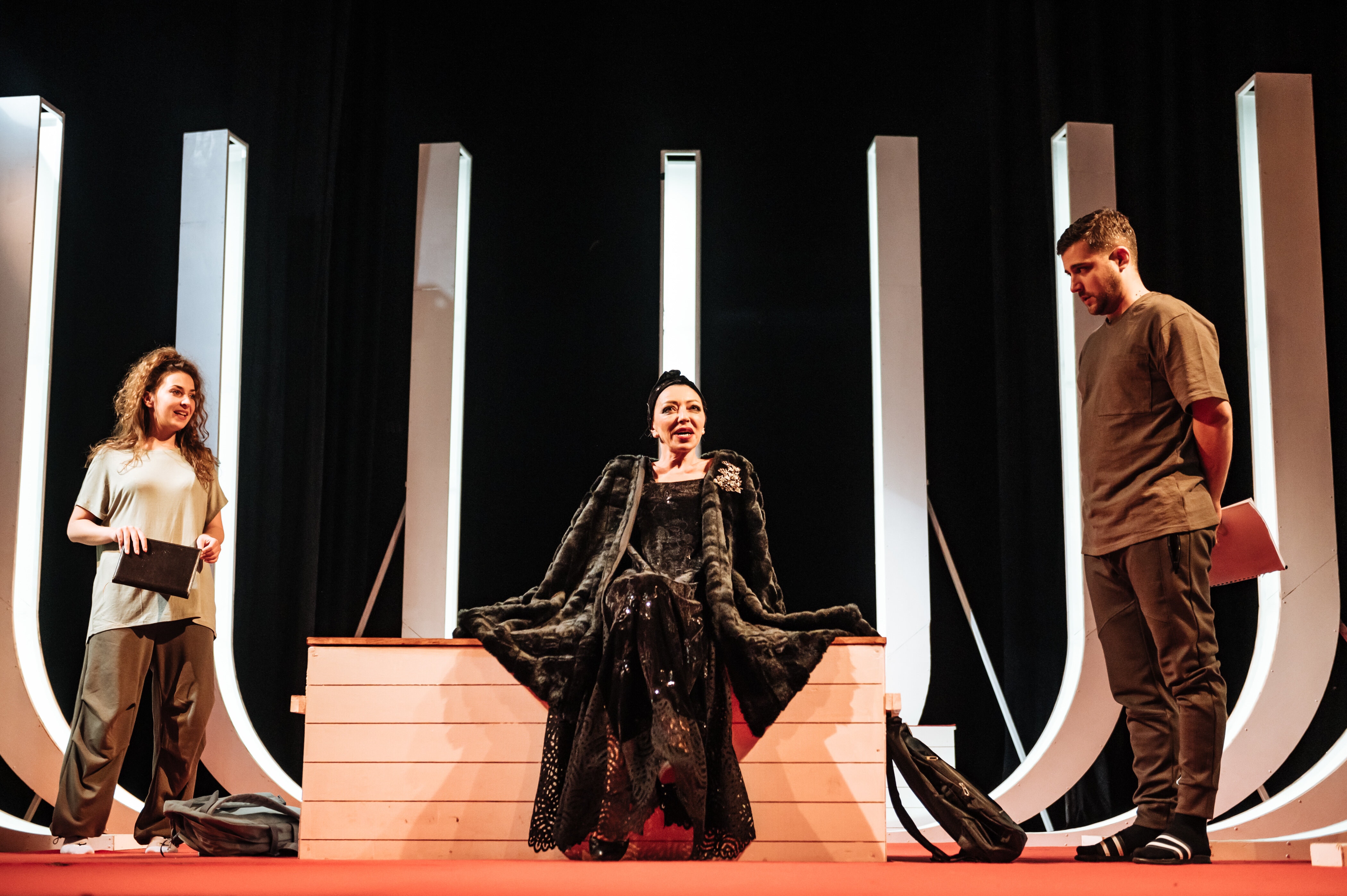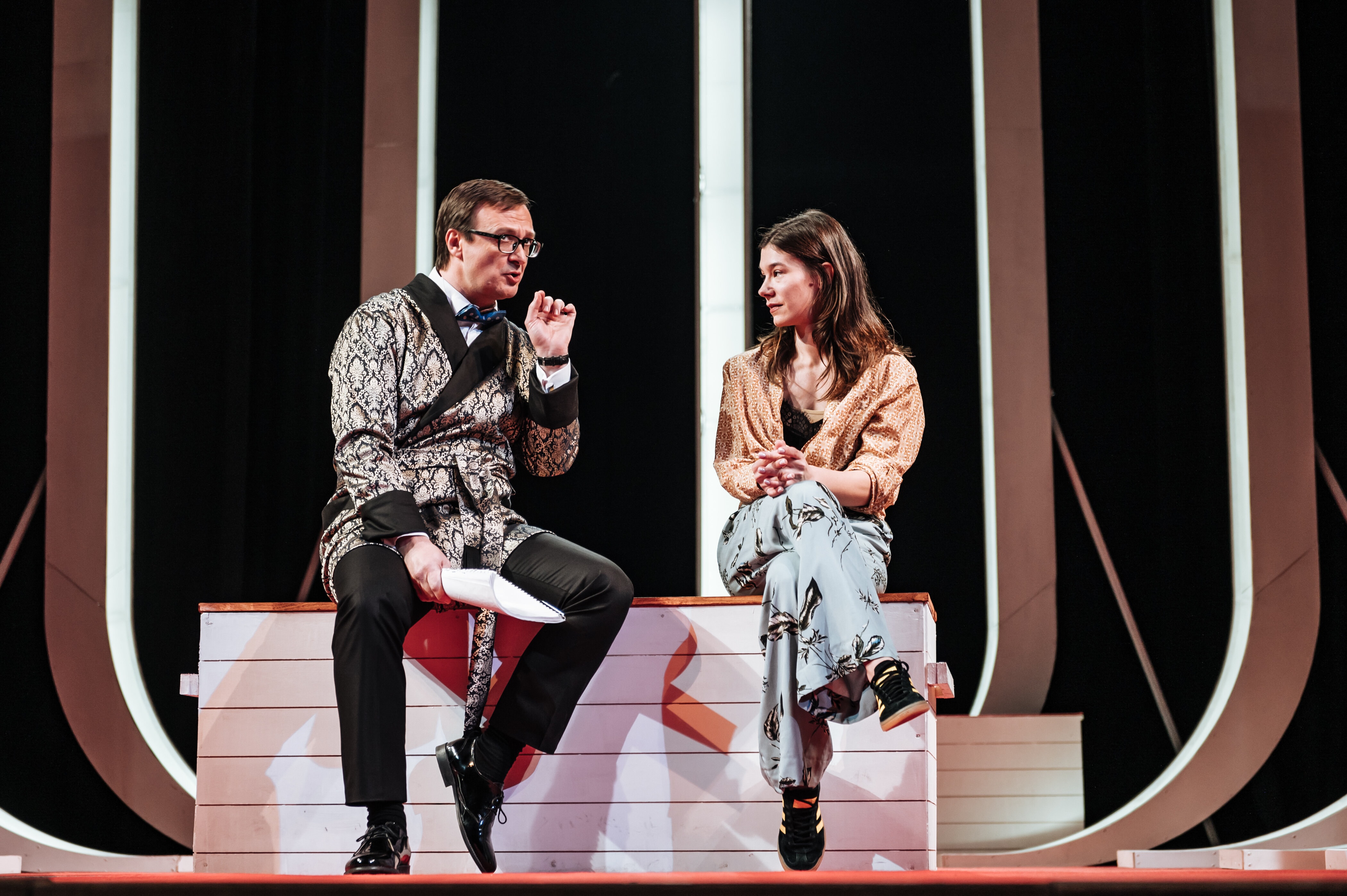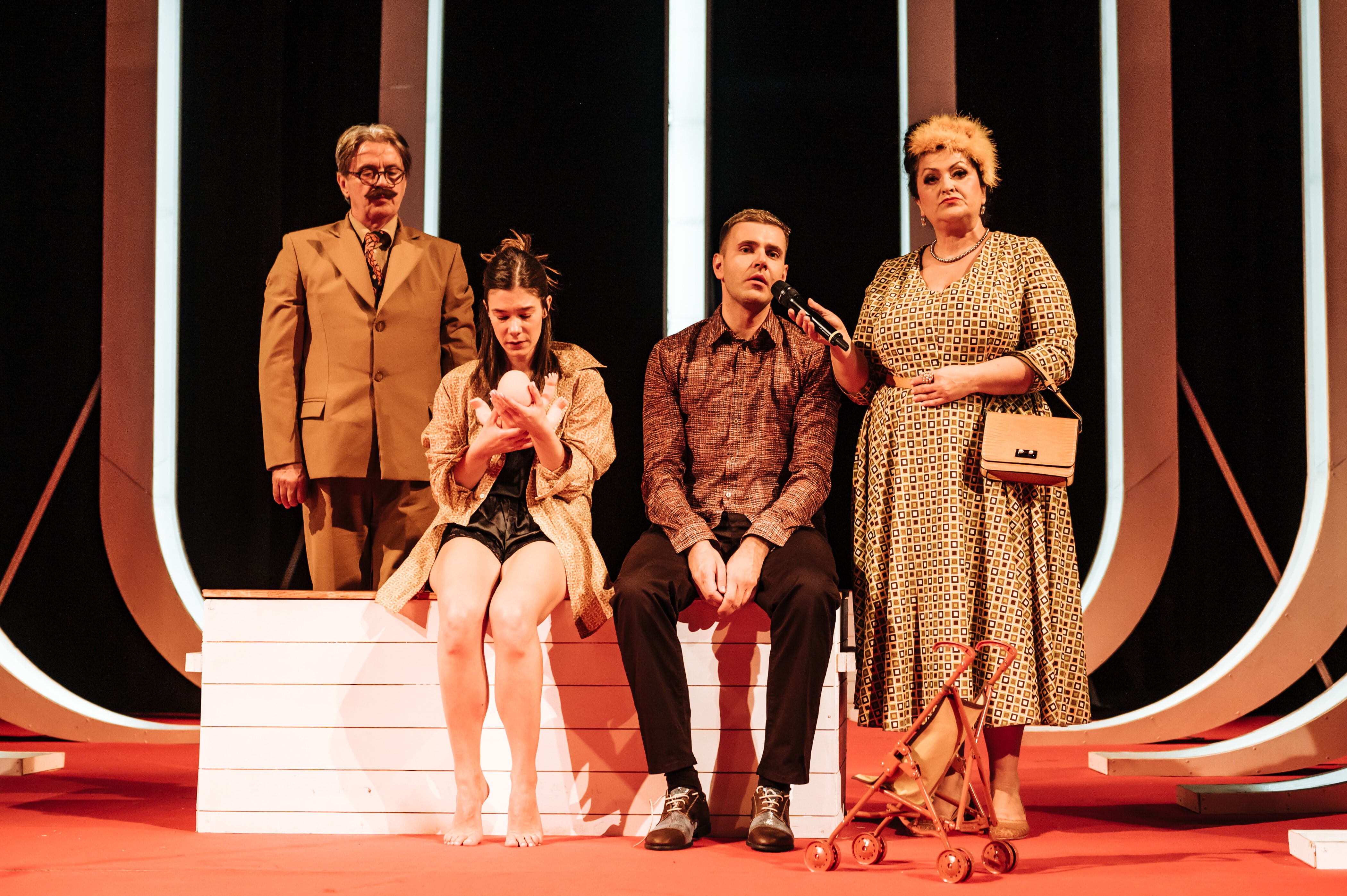
THE DOLL SHIP
BIOGRAPHY OF THE WRITER
Milena Marković, one of the most significant Balkan writers, was born in 1974 in Belgrade. She graduated in dramaturgy at the Faculty of Dramatic Arts, where she currently works as a full-time professor.
She is the author of eleven plays and one opera, several collections of poetry, screenwriter of six films, three series, and participated in several projects as a co-screenwriter.
Her plays and poems were translated into English, French, German, Hungarian, Swedish, Polish, Turkish, Romanian, Spanish, Slovenian, Macedonian.
She is the winner of NIN’s award for 2021 (the novel Children), several poetry awards, three Steria awards for the best drama in the Serbian language (Dragon Slayers 2015, The Doll Ship 2008, Nahod Simeon 2007), special Steria theater award (Railroad Tracks 2004), special award for the best dramas from the ex-YU region, award for drama creation “Borisav Mihajlović Mihiz”, for new sensibility “Todor Manojlović”, award “Miloš Crnjanski”, award for the best screenplay at FEST 2016 (film Homeland ) and numerous other awards.
Her plays have been performed all over Europe, as well as in the United States and Japan, and her films have been screened and awarded at international festivals.
She is currently writing a new novel and creating a new series.
BIOGRAPHY OF THE DIRECTOR
Iva Milošević, born in 1977 in Belgrade. Graduated in theater and radio directing at the Faculty of Dramatic Arts in Belgrade.
She directed the following shows:
In Belgrade: Much ado about nothing V. Shakespeare, A Month in the Country I. S. Turgenev, Dragon Slayers by Milena Marković, From the Heroic Life of Citizens by Carl Sternheim, Drama about Mirjana and those around her by Ivor Martinić, Phaedra’s Love by Sarah Kane, Breaking by Neil Labjut, Shopping & Fucking by Mark Ravenhill (Yugoslav Drama Theater);
Amsterdam M. A. Jasur, the Government Inspector N. Gogol, Celebration T. Winterberg and M. Rukov, Snake Pit V. Sigarev, Road to Nirvana A. Hooves (Atelier 212); Elektra by Danilo Kiš (National Theater in Belgrade); Wolfgang Bauer’s Magical Afternoon (Bitef Theatre);
Gloria (musical) by Ranko Marinković (Theatre at Terazije);
The Little Humpback Horse by the Presnyakov Brothers, Igor Bojović’s Cinderella and Igor Bojović’s Princess and the Frog (Theatre “Boško Buha”);
The Little Mermaid H. K. Andersen and Srđan Koljević (Little Theater “Duško Radović”);
The Wolf and the Seven Kids, Brothers Grimm and Ljubinka Stojanović (Puppet Theater “Pinocchio”);
In Novi Sad: Misanthrope J. B. P. Moliere (co-directed by Gorčin Stojanović), Tales from the Vienna Forest by Eden von Horvat and Painkillers by Neda Radulović (Serbian National Theatre);
In Sombor: The Bald Singer by Eugenia Ionesca and Casimir and Caroline by Eden von Horvat (National Theater in Sombor);
In Subotica: the Selector K. Trifković, Evil Woman by Jovan Steria Popović (National Theater Subotica);
In Užice: Miracle in Šargan by Ljubomir Simović (National Theater in Užice);
In Zagreb (Croatia): Marathon runners run the circle of honor by Dušan Kovačević (Kerempuh Satirical Theatre);
In Prilep (Macedonia): Much ado about nothing (National Theater “Vojdan Černodrinski”).
She is the winner of the “Bojan Stupica” and “Ljubomir Muci Draškić” directing awards, as well as the annual SNT and YDT directing awards.
The shows she directed were performed in Stuttgart (Germany), Bogota (Colombia), San Jose (Costa Rica), Guadalajara (Mexico), Sibiu (Romania), Madrid, Rome, Prague, Graz, Zagreb, Rijeka, Split, Sarajevo, Ljubljana, Brčko , Banja Luka, Kotor, Budva, as well as at all important festivals in Serbia.
A WORD FROM THE DIRECTOR
“I would like to do what no one has done.”
How can one become a complete and authentic personality if everything around us imposes on us to act within the given models? Is such a world, in which banality, superficiality and the pursuit of power reign, too small for personalities who are adorned with sensitivity, creativity and the need to touch the essence of a fulfilled life? How not to lose faith in love in such a world?
DE/ILLUSIONISM OF FAIRY TALES
The play The Doll Ship arrived on the repertoire of the National Theater in Niš in 2023/24, after already a considerable number of staging’s by other theaters in Serbia and the world, awards won at various festivals (from Steria Theater, BITEF and the Yugoslav Theater Festival – “Without translation”, to festivals in Banja Luka, Rijeka, Wiesbaden, etc.), multifaceted critical and scientific theoretical observations and the undivided opinion of readers and audiences that they are encountering an extraordinary work of art.
The de/illusionist, fairy-tale reality of the Doll Ship, like a kind of mimesis with a mistake, takes over from extra-artistic reality and transforms the individual stunned by the analogy that they establish between them, to the point of indistinguishableness. As psychology and sociology teach us, fairy tales on a conscious level help to instill social norms in the consciousness of young people, while on a subconscious level they can provide insight into an attractive, stereotypical series of roles, locations and time schedules of an unstable life model. In this way, the Doll Ship becomes an attempt to find out and establish new legislative and customary rules and habits of the culture system that is constituted in society “here and now”. Moving from the conscious to the unconscious, Milena Marković in her most poetic and personal dramatic text, taking over the motifs of various fairy tales – Alice in Wonderland, Snow White and the Seven Dwarfs, Goldilocks, Thumbelina, Hansel and Gretel, draws the path of growing up, maturing and the decay of her heroine. With the chronology of autobiography, biography, life, she establishes a generic and genealogical model of a woman, who carries her tragic guilt in her archetypal code of “original sin” of the desire for liberation and knowledge, and is punished for this by an autistic birth. Initiation into the world of growing up begins as Alice’s entry into the world of fairy tale wonders, into which the young woman enters with all the accumulated experience of a carefree childhood and told fairy tales, so that in each subsequent step, with a simplified view of the world of the “person who lives in a fairy tale”, different poetic and with genre procedures (from grotesque, through persiflage, farce, to naturalism, critical realism, sentimentalism and tragicomic syncretism) travestied every naturalistically stripped-down life situation into the world of a fairy tale that recognizes that situation. From this she makes a list of the main roles of fairy tales, from which life roles are then drawn. Thus, the street gang transforms into the dwarfs Doc, Grumpy and Sleepy, and she transforms into Snow White, the petty-bourgeois family into the bear family, and she into Goldilocks, a licentious artist and a ticket to enter the world of art (to which he leaves from the world of the petty bourgeoisie, in which he does not belong with his artistic habitus) in the Frog and she into Thumbling, until, as an already recognized artist, sunk into the vice of alcohol and parental care, she recognizes and deconstructs herself into a Witch, and the children who come to her like pilgrims to a shrine, fascinated by her as an artist, she transforms into the characters of Hansel and Gretel. Her death ends the generational chain and opens the possibility of a new one. However, like her life, the autism of her birth persists as a simulation of reality.
The transition from character to character, and their changing of dramaturgical and sociological places and types, additionally creates an awareness of the ambivalence of intertextual permeation. In the triangle theatrical reality ↔ extra-artistic reality ↔ fairy tale, each of the vertices, in the intimate game of deaf phones, becomes the meta-theme of the other two. Hence, after playing out the dream and dreaming, we enter the world of growing up, the space of what is generally defined by the term reality, or more precisely the dreamed reality, which does not hide that it is nothing but the space of a theatrical act. At the same time, it rises to a higher symbolic plane and becomes an “attic of memories”, full of unnecessary trinkets in a strange world of intimacy and play. From there, the Doll Ship calls to mind the structure and pragmatics of cabaret: an imaginary world of libido, repressed desires, intimacy, self-affirmation, disillusionment, explicit and implicit cynicism, satirical murderousness, provocation, music, in which sexuality rises to the level of necessary, eruptively verbal and corporeal, socially engaged and communicative, intertextual and self-reflexive, banal and sublime. Moving with each of its elements through different layers of consciousness, subconsciousness and reality, through different associations, organizing characters around a whole series of thematic axes, the text the Doll Ship survives as an aggregate of potentially unlimited and always new readings.
In a pragmatic sense, Milena Marković also raises questions about the nature of modern life and about the threatening feeling of doubt and loss. She creates a genealogical history to explore how we got to where we are and what to do next. The subtitle of her first piece Pavilions – “or where I’m going, where I’m coming from and what’s for dinner” – can be applied to all her other pieces without any hesitation. The generic subcode in the genealogical model, viewed in this way, should be understood as situation and behavior models and beyond the primary topic. His social place, conditionally speaking, is at the same time fictitious: the place of the strongest crystallization of antagonistic forces, of which Milena Marković sees positives in small people without an activist drive, but with a strong moral imperative. From there he derives a whole series of questions, which can be reduced to one: can people and their society survive on shabby, outdated ideals and values that no one really believes in anymore?
Assosiate Professor Spasoje Ž. Milovanović, MA theatrologist

Cast
Little sister, Alice, Snow White, Goldilocks, Thumbelina, Princess, Woman: Ana Mandić
Witch - Evgenija Stanković
Mother - Snežana Petrović
Big sister - Bratislava Milić
Mother bear - Vesna Stanković
Papa bear, Hunter - Dragiša Veljković
Little bear - Uroš Milojević
Doc - Danilo Petrović
Sleepy - Stefan Mladenović
Grumpy: -Andrija Mitić
Frog - Aleksandar Krstić
Eagle - Marko Pavlovski
Hansel - Marko Radojević
Gretel - Natalija Jović
Musicians:
Aleksandar Stevanović (accompanist, composer's assistant, keyboards)
Goran Savić (electric guitar)
Predrag Branković (bass guitar)
Nenad Tančić (drums)
Technical Crew
Technical director: Dejan Mitić
Sound design: Slobodan Ilić
Lighting design: Vojkan Dobrosavljević
Light operator: David Jovanović
Stage master: Slaviša Filipović
Stage dressers: Srđan Kitanović, Miodrag Đorđević, Mića Lazarević, Nikola Stojanović
Props coordinator: Nemanja Perić, Dragan Nikolić
Wardrobe: Dušica Mladenović, Katarina Pavlović
Makeup artists, hairdressers: Ljiljana Rašić, Marija Cvetanović, Ivana Lazarević
Tailoring works: Marina Stevanović, Vladimir Pekić
Workshop: Goran Stanković, Dragan Perić, Branislav Nikolić, Aleksandar Rajić
Procurement: Zoran Denčić, Ivan Todorović
Driver: Nebojsa Šarčević

 srpski
srpski English
English
